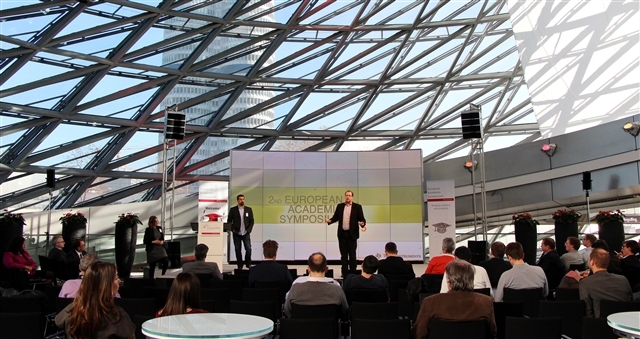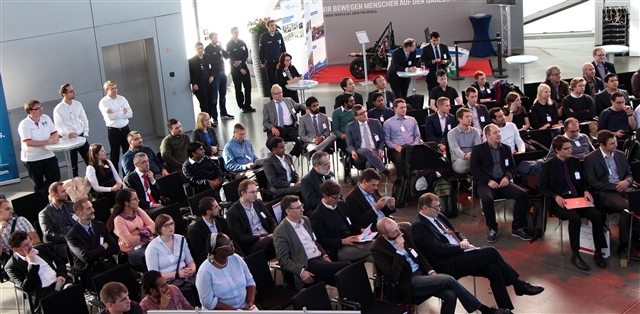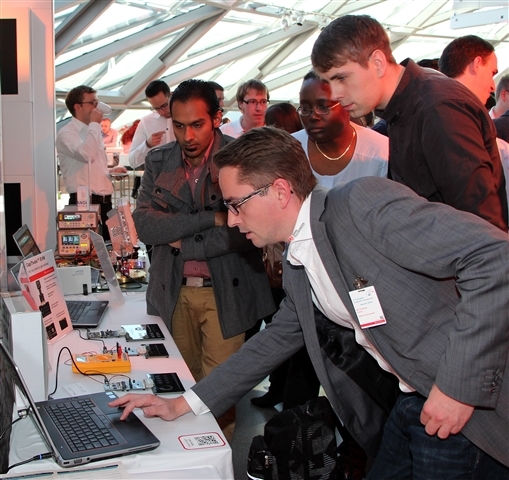The European University Program held its 2nd TI European Academic Symposium at the BMW Welt in Munich, Germany on November 2nd and 3rd. University educators and TI experts from across Europe had the chance to meet, share experiences and discuss educational aspects of today’s new technologies. As part of its annual student competition, the TI Innovation Challenge (TIIC) European Design Contest, the company awarded tomorrow’s new design stars at the conclusion of the symposium.
 Guest speakers host a Q&A on industry and academia collaboration.
Guest speakers host a Q&A on industry and academia collaboration.
The first half of the event included key note speeches covering power management in education and industry and how the TI Power Management Lab Kit (PMLK) brings the two fields together. Speakers also covered automotive trends in power and drives in the academic space. Forty European professors explored how these innovative technologies can be leveraged into the university curricula and how these tools can help their students acquire skills highly valued in the industry.
 Attendees at the Academic Symposium eagerly await the announcement of the TIIC winners.
Attendees at the Academic Symposium eagerly await the announcement of the TIIC winners.
TI representatives shared initiatives taken by the company to keep an innovative spirit alive within TI such as R&D Kilby Labs, new industrial and automotive applications and market-changing projects on industry 4.0 within the framework of the Horizon2020 European Commission’s agenda. In addition, recently graduated university students presented their views on entrepreneurship – speaking on opportunities for student start-ups and recruitment prospects for future engineers.
 TIers showcased demos of TI technology to attendees at the Academic Symposium.
TIers showcased demos of TI technology to attendees at the Academic Symposium.
The event closed with the TI Innovation Challenge Europe design contest finalist award announcement. The TIIC contest allows European students to work on a system-level project, solving today’s problems with automotive and industrial applications. This year, students from more than 30 countries in Europe, the Middle East, and Africa participated in the competition.
For the 2015 TIIC, the University of Ljubljana (Slovenia) won first place for their industrial project based on a piezoelectric deformable mirror that used many different TI analog ICs, creating a low-cost high-precision beam steering. The heart of this project was the MSP430F5529 ultra low-power microcontroller.
Luebeck University (Germany) won second by designing a wearable device for data acquisition based on TI connectivity parts. The third prize went to KU Leuven in Belgium for their intelligent lighting system processed with TI LED drivers, TI analog and power management. Finally, ETH Zurich (Switzerland) designed an energy harvesting application that brought them fourth place, based on TI power management components.
 The final four teams accept their award prize at the TIIC finals in Munich.
The final four teams accept their award prize at the TIIC finals in Munich.
“It is very exciting to observe how the TIIC is growing year by year, to become the leading electronics design contest in Europe,” said Nuria Llin, European university program manager. “We are glad to start the 2016 TIIC with 3 different competing categories: automotive, industrial and innovation.”
Each category’s winner will spend a week at the TUM University to develop a prototype and explore the possibility of running their own start-up, as several past TIIC winners have gone on to develop their own start-up around the project that won in the contest. These students will have the opportunity to attend a workshop in coordination with key industrial players such as Bosch and BMW as leading car manufacturers.
 Attendees at the event heard from past TIIC winners and got to participate in their virtual racing technology.
Attendees at the event heard from past TIIC winners and got to participate in their virtual racing technology.
Professor Nicola Femia, power management educator at University of Salerno and one of the attendees to the symposium stated, "Teaching has to evolve in harmony with technologies, and the TI Academic Symposium is a great opportunity for university professors to discuss visions, experiences and tools for engineering education.”
“The university contributions to the symposium and the projects presented by the student teams at the TIIC Europe Design Contest provide significant elements for the future roadmap of education,” Femia continued. “The student projects, in particular, provide an intense stimulus to professors and students themselves to better understand how to use new technologies to solve real-world problems."
See more pictures from the event.
Sign up to receive information about the 2016 TIIC European Contest.
